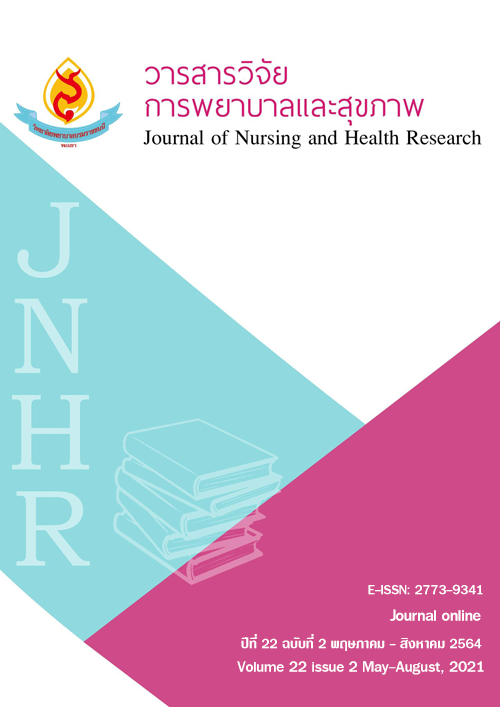ประสบการณ์ของนักศึกษาพยาบาลในการเรียนรู้แบบโครงงาน:การจัดทําสื่อวีดิทัศน์เพื่อส่งเสริมสุขภาพของเด็กและวัยรุ่น
คำสำคัญ:
ประสบการณ์, นักศึกษาพยาบาล, การเรียนรู้แบบโครงงาน, สื่อวีดิทัศน์บทคัดย่อ
การศึกษานี้เป็นการวิจัยเชิงคุณภาพเชิงพรรณนา (descriptive qualitative research) มีวัตถุประสงค์เพื่อศึกษาประสบการณ์ของนักศึกษาพยาบาลในการเรียนรู้แบบโครงงานการจัดทำสื่อวีดิทัศน์เพื่อส่งเสริมสุขภาพของเด็กและวัยรุ่น ผู้ให้ข้อมูลเป็นนักศึกษาพยาบาลชั้นปีที่ 2 มีผู้ให้ข้อมูลทั้งสิ้น 10 ราย ถูกคัดเลือกตัวอย่างกรณีหลากหลาย (Maximum variation sampling) ตามคุณสมบัติที่กำหนด ผู้ให้ข้อมูลถูกสัมภาษณ์แบบเจาะลึก (in-depth interview) โดยใช้แบบสัมภาษณ์กึ่งโครงสร้าง (semi-structured interview) และวิเคราะห์ข้อมูลโดยใช้กระบวนการวิเคราะห์แก่นสาระ (thematic analysis) ผลการวิจัยพบ 3 แก่นสาระหลักคือ 1) บทบาทผู้สอน มีแก่นสาระย่อย ได้แก่ ทักษะการถ่ายทอด ให้อิสระในการเรียนรู้ตามความสนใจของผู้เรียน ใช้เทคโนโลยีสืบค้นข้อมูลและติดต่อสื่อสาร และพร้อมให้คำปรึกษา 2) การสะท้อนคิดเกี่ยวกับการจัดทำนวัตกรรม มีแก่นสาระย่อย ได้แก่ ใช้กระบวนการวิจัย ประยุกต์ใช้ ความรู้ที่หลากหลาย คำนึงถึงกลุ่มเป้าหมาย ใช้หลักฐานเชิงประจักษ์ เรียนรู้เท่าทันสารสนเทศ และพัฒนาทักษะด้านสื่อ และเทคโนโลยี 3) ทักษะชีวิต มีแก่นสาระย่อย ได้แก่ จัดการผสานความสามารถของสมาชิก/การบริหารเวลา เรียนรู้กระบวนการกลุ่มและทำงานเป็นทีม และโอกาสในการพัฒนาการปฏิบัติการพยาบาล ผลวิจัยแสดงให้เห็นว่าการจัดการเรียนรู้แบบโครงงานช่วยส่งเสริมให้นักศึกษาพยาบาลเกิดทักษะแห่งศตวรรษที่ 21 โดยเฉพาะอย่างยิ่งทักษะด้านสารสนเทศสื่อและเทคโนโลยี และทักษะชีวิต ทั้งนี้ผลการวิจัยครั้งนี้เป็นข้อมูลเบื้องต้นเกี่ยวกับการจัดการเรียนรู้แบบโครงงานซึ่งสามารถนำไปใช้ในการพัฒนาการเรียนรู้แบบโครงงานสำหรับรายวิชาทางการพยาบาลในสาขาอื่น ๆ
เอกสารอ้างอิง
กมลรัตน์ เทอร์เนอร์, นวพร มามาก, ณัฐนิชา ศรีละมัย และ ละเอียด แจ่มจันทร์. (2561). ผลการใช้การเรียนรู้แบบโครงงานสะเต็มเพื่อส่งเสริมทักษะศตวรรษที่ 21 ในนักศึกษาวิทยาลัยพยาบาล.วารสารคณะพยาบาลศาสตร์มหาวิทยาลัยบูรพา. 26(2), 11-19.
ดารุณี บุญครอง. (2560). วิเคราะห์แนวทางการจัดการศึกษาไทยกับการขับเคลื่อนการศึกษาสู่ยุคไทยแลนด์ 4.0. สารอาศรมวัฒนธรรมวลัยลักษณ์. 17(2), 1-25.
ธนภรณ์ จุลพูล, นินนาท์ จันทร์สูรย์ และ เมธี ดิสวัสดิ์. (2563). การจัดการเรียนรู้ตามแนวทางสะเต็มศึกษาด้วยชุดอุปกรณ์การชุบโลหะทองแดงด้วยไฟฟ้าที่มีต่อความคิดสร้างสรรค์ทางวิทยาศาสตร์ของนักเรียนระดับชั้นมัธยมศึกษาปีที่ 5. วารสารศึกษาศาสตร์ มสธ. 13(1), 205-219.
ประไพพิมพ์ สุธีวสินนนท์ และ ประสพชัย พสุนนท์. (2559). กลยุทธ์การเลือกตัวอย่างสำหรับการวิจัยเชิงคุณภาพ. วารสารปาริชาต มหาวิทยาลัยทักษิณ. 29(2), 31-48.
พิชิต ฤทธิ์จรูญ. (2557). ปฏิบัติการวิจัยในชั้นเรียน: ครูทุกคนทำได้ไม่ยาก (พิมพ์ครั้งที่ 11). กรุงเทพฯ:บริษัท เฮ้าส์ ออฟ เคอร์มิสท์ จำกัด.
วิจารณ์ พานิช. (2555). วิถีสร้างการเรียนรู้เพื่อศิษย์ในศตวรรษที่ 21. กรุงเทพฯ: มูลนิธิสดศรี-สฤษดิ์วงศ์.
Braun, V., & Clarke, V. (2006). Using thematic analysis in psychology. Qualitative Research in Psychology, 3(2), 77-101. doi:10.1191/1478088706qp063oa/
Kelley, T. R., & Knowles, J. G. (2016). A conceptual framework for integrated STEM education. International Journal of STEM education, 3(1), 1-11. doi:10.1186/s40594-016-0046-z/
MacFarlane, B. (2016). Infrastructure of comprehensive STEM programming for advanced learners. In B. MacFarlane (Ed.), STEM education for high-ability learners designing and implementing programming (pp. 139–160). Waco, TX: Prufrock Press.
McCurry, M. K., & Martins, D. C. (2010). Teaching undergraduate nursing research: a comparison of traditional and innovative approaches for success with millennial learners. The Journal of Nursing Education, 49(5), 276–279. doi.org/10.3928/01484834-20091217-02/
Miller, H. M. (2010). 21st Century skills: learning for life in our times. Middle Ground, 13(3), 38.STEM Nursing Initiative. (2018). New York University. Retrieved April 6, 2021, from http://www.nyu-x.org/stem-nursing/
Thorne, S. (2011). Toward methodological emancipation in applied health research. Qualitative Health Research, 21(4), 443-453. doi:10.1177/1049732310392595/
Wurdinger, S., & Qureshi, M. (2015). Enhancing college students’ life skills through project based learning. Innovative Higher Education, 40(3), 279-286. doi:10.1007/s10755-014-9314-3/
ดาวน์โหลด
เผยแพร่แล้ว
รูปแบบการอ้างอิง
ฉบับ
ประเภทบทความ
สัญญาอนุญาต
ลิขสิทธิ์ (c) 2021 วารสารวิจัยการพยาบาลและสุขภาพ

อนุญาตภายใต้เงื่อนไข Creative Commons Attribution-NonCommercial-NoDerivatives 4.0 International License.



